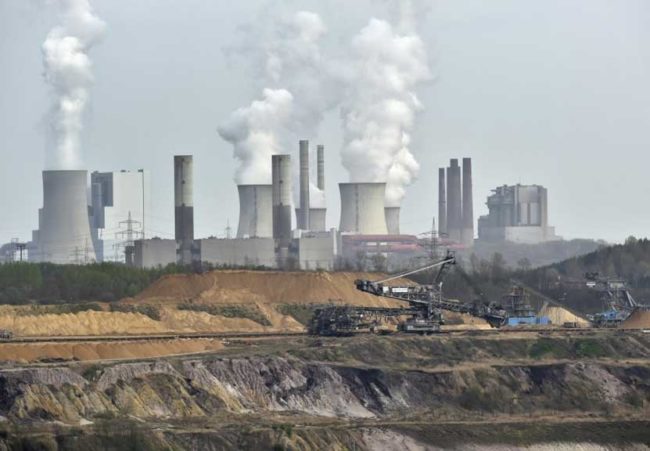
The prevailing initiatives for addressing climate change are focused upon the reduction of our CO2 emissions via the Paris Agreement. This is of course a rather obvious step, but what is also becoming clear is that current goals will not be enough. Some longer term thinking has been articulated within a new study entitled “Young people’s burden: requirement of negative CO2 emissions.”
Published within the open access journal Earth System Dynamics on 18th July, it lays out the case for the removal of CO2 if we wish to keep climate change within safe limits.
Two Bits of Background information
Two rather interesting bits of associated information make this a rather interesting paper.
The lead author is James Hansen
Over 29 years ago back in 1988 James Hansen testified before congress. This was a key turning point because it brought the entire issue of Climate Change into public consciousness. Wikipedia lays it out as follows …
Hansen was invited to testify before the United States Senate Committee on Energy and Natural Resources on June 23, 1988.[72] Hansen testified that “Global warming has reached a level such that we can ascribe with a high degree of confidence a cause and effect relationship between the greenhouse effect and observed warming…It is already happening now”[51] and “The greenhouse effect has been detected and it is changing our climate now…We already reached the point where the greenhouse effect is important.”[73] Hansen said that NASA was 99% confident that the warming was caused by the accumulation of greenhouse gases in the atmosphere and not a random fluctuation.[51][73]
According to science historian Spencer R. Weart, Hansen’s testimony increased public awareness of climate change.[74] According to Richard Besel of California Polytechnic State University, Hansen’s testimony “was an important turning point in the history of global climate change.”[72] According to Timothy M. O’Donnell of the University of Mary Washington, Hansen’s testimony was “pivotal,” “ignited public discussion of global warming and moved the controversy from a largely scientific discussion to a full blown science policy debate,” and marked “the official beginning of the global warming policy debate.”[75] According to Roger A. Pielke of the National Center for Atmospheric Research, Hansen’s “call to action” “elevated the subject of global warming and the specter of associated impacts such as more hurricanes, floods, and heat waves, to unprecedented levels of attention from the public, media, and policy makers.”[76]
This new paper will be part of a lawsuit against the US federal government
Chelsea Harvey explains this aspect within a recent Washington Post article …
The research was largely inspired by a landmark climate change lawsuit brought by 21 children against the federal government, which is scheduled to go to trial in February 2018, and will be used as scientific support in the case. In fact, its lead author, Columbia University climatologist and former NASA scientist James Hansen, is a plaintiff on the case, along with his now 18-year-old granddaughter.
The Paper – Young people’s burden: requirement of negative CO2 emissions.
As a brief summary …
- The Paris Agreement goal of keeping Global Temperatures within the 1,5 to 2 C range will not be enough to avoid catastrophic climate change.
- Global Temperature is correlated with sea level.
- Earth is now as warm as it was during the prior (Eemian) interglacial period, when sea level reached 6–9 m higher than today [Section 2 of the paper]
- Earth is out of energy balance with present atmospheric composition, implying that more warming is in the pipeline [Section 3 of the paper]
- The growth rate of greenhouse gas climate forcing has accelerated markedly in the past decade [Section 5 of the paper]
- We need “negative emissions”, i.e., extraction of CO2 from the air now [reforestation and steps to improve soil fertility and increase its carbon content, may provide much of that necessary CO2 extraction] [Section 9 of the paper]
- Act now and irreversible climate impacts could be minimized, but if we continue with high fossil fuel emissions then the burden on young people will demand a massive technological CO2 extraction program.
Responses
The Washington Post article documents a few interest responses to this, some of which do criticise the paper, but one of those critics does make this rather good point …
“The more important point is that we cannot rule out the very real probability that there are slow feedbacks — and risk is probability times cost. … Once you start thinking in terms of risks I would concur with Dr. Hansen that the current trajectory presents some unacceptable risks.” – Cristian Proistosescu
Tweets
Report: James Hansen et al: Young People’s Burden: Requirement of Negative CO2 Emissions https://t.co/dw2I8itCUP pic.twitter.com/xawU7yF0Gq
— Svein T veitdal (@tveitdal) July 19, 2017
James Hansen is giving a boost to the kids suing Trump over climate change https://t.co/Xlvds3VQGP via @HuffPost pic.twitter.com/Sq49XhkTJk
— Climate Central (@ClimateCentral) July 20, 2017
Scientist James Hansen releases new paper to bolster youth climate case against U.S. government https://t.co/iRBXxfnmZF pic.twitter.com/mUoPXSya71
— Climate Progress (@climateprogress) July 18, 2017
Kids Suing Government For A Stable Climate Get Help From Scientist, James Hansen https://t.co/lT7QCyRkD5 via @CleanAirMoms #CleanAirKids
— Moms Clean Air Force (@CleanAirMoms) July 20, 2017
Burden of climate change falls on today's youth. Scientist James Hansen & granddaughter explain: https://t.co/P08Z9FOhDx #YouthvGov pic.twitter.com/6r9iPoZQV4
— Climate Nexus (@ClimateNexus) July 19, 2017